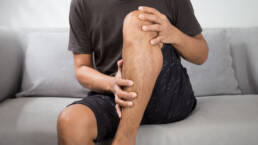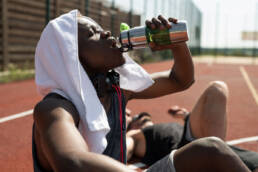As runners in the vibrant city of Denver Metro, we’re privileged to explore a myriad of scenic trails, bustling streets, and breathtaking landscapes. Yet, amidst the exhilaration of our runs, we often encounter roadblocks that hinder our progress and dampen our spirits. Whether it’s the nagging pain of shin splints, the tightness of IT band syndrome, or the strain of muscle imbalances, these injuries and strains can derail our training and leave us sidelined.
But fear not, fellow runners, for there’s a solution that lies in the skilled hands of Denver Sports Massage Therapy. In this blog, we’ll explore how sports massage therapy can be the key to overcoming these roadblocks, enabling us to run stronger, faster, and with greater joy.
Understanding the Running Landscape in Denver Metro
Before we delve into the benefits of sports massage therapy, let’s take a moment to understand the unique challenges faced by runners in the Denver Metro area. From the undulating terrain of the Rocky Mountains to the high-altitude conditions that define our city, Denver runners contend with a variety of factors that can contribute to injuries and strains.
The Role of Sports Massage in Injury Prevention
In the dynamic world of running, injury prevention is not just a goal—it’s a necessity. As Denver runners lace up their shoes and hit the trails amidst the stunning backdrop of the Rocky Mountains, they face a myriad of challenges that can put strain on their bodies and increase the risk of injury. From the steep inclines of mountain trails to the unforgiving pavement of urban streets, every step carries the potential for strain and overuse.
Enter sports massage—a powerful tool in the runner’s arsenal for injury prevention and overall well-being. At its core, sports massage therapy employs a variety of techniques designed to address muscular imbalances, reduce tension, and promote optimal function throughout the body. Here’s how sports massage plays a crucial role in keeping Denver runners injury-free and on the road to success:
Identifying and Addressing Muscle Imbalances
Muscle imbalances are a common culprit behind many running injuries, often stemming from overuse, poor biomechanics, or inadequate training. Sports massage therapists are trained to assess these imbalances through palpation and movement analysis, identifying areas of tension, weakness, or restriction within the muscles. By targeting these imbalances through specific massage techniques, such as deep tissue manipulation and myofascial release, sports massage helps to restore balance and symmetry to the body, reducing the risk of strain and injury.
Promoting Flexibility and Range of Motion
Flexibility and range of motion are essential components of injury prevention for runners, allowing for efficient movement and reducing the likelihood of muscle strain. Sports massage therapy helps to enhance flexibility by breaking up adhesions, releasing tight muscles, and improving joint mobility. Through techniques such as stretching, passive movement, and dynamic stretching, sports massage therapists work to increase the elasticity of muscles and connective tissues, enabling runners to move more freely and with greater ease.
Enhancing Circulation and Recovery
Optimal circulation is crucial for maintaining tissue health and facilitating recovery from the demands of training and competition. Sports massage therapy promotes circulation by stimulating blood flow and lymphatic drainage throughout the body, delivering essential nutrients and oxygen to muscle tissues while removing metabolic waste products. This enhanced circulation accelerates the recovery process, reducing post-exercise soreness and fatigue and helping runners bounce back faster after intense workouts or races.
Addressing Trigger Points and Soft Tissue Restrictions
Trigger points—localized areas of muscle tightness and tenderness—are a common source of pain and dysfunction for runners, often contributing to injuries such as muscle strains, tendonitis, and stress fractures. Sports massage therapy targets these trigger points through techniques such as trigger point release, deep tissue massage, and neuromuscular therapy, helping to alleviate pain and restore normal muscle function. By addressing soft tissue restrictions and restoring optimal muscle length, sports massage helps to prevent injuries before they occur, allowing runners to stay on track with their training goals.
Providing Education and Self-Care Strategies
In addition to hands-on therapy, sports massage therapists play a vital role in educating runners about injury prevention and self-care strategies. From proper warm-up and cool-down techniques to postural awareness and biomechanical analysis, sports massage therapists empower runners with the knowledge and tools they need to take an active role in their own injury prevention. By incorporating these strategies into their training routine, Denver runners can minimize the risk of injury and maximize their potential for success on the roads and trails.
In essence, sports massage therapy is not just about addressing injuries after they occur—it’s about taking a proactive approach to injury prevention and overall well-being. By incorporating sports massage into their training regimen, Denver runners can stay injury-free, perform at their best, and continue to pursue their passion for running with confidence and joy. So, whether you’re a novice trail enthusiast or a seasoned marathoner, consider the role of sports massage therapy in keeping you on the road to success. Your body—and your running journey—will thank you for it.
Targeting Common Running Injuries with Sports Massage
Running is a sport that brings immense joy, but it’s not without its risks. Denver runners often encounter a variety of injuries and ailments as they push their limits on the city’s diverse terrain. From the concrete jungle of urban streets to the rugged trails of the Rockies, each step carries the potential for strain, overuse, and injury. Fortunately, sports massage therapy offers a targeted and effective approach to addressing these common running injuries, allowing runners to recover faster, perform better, and stay on track with their training goals. Here’s how sports massage therapy targets some of the most prevalent running injuries in Denver:
IT Band Syndrome
Iliotibial band syndrome, or IT band syndrome, is a common injury among runners, characterized by pain and inflammation on the outside of the knee. This condition often arises from overuse and tightness in the IT band—a thick band of connective tissue that runs along the outside of the thigh. Sports massage therapy targets IT band tightness through techniques such as friction massage, myofascial release, and stretching. By releasing tension and restoring flexibility in the IT band and surrounding muscles, sports massage helps to alleviate pain and promote healing, allowing runners to return to their training regimen with confidence.
Shin Splints
Shin splints, or medial tibial stress syndrome, are another frequent complaint among runners, manifesting as pain along the shinbone (tibia) during or after exercise. This condition often results from overuse, improper footwear, or biomechanical issues such as flat feet or overpronation. Sports massage therapy can help alleviate shin splints by targeting tightness and inflammation in the muscles of the lower leg, including the tibialis anterior, soleus, and gastrocnemius. Through techniques such as deep tissue massage, trigger point therapy, and myofascial release, sports massage helps to reduce pain, improve circulation, and promote healing, allowing runners to get back on their feet and back to doing what they love.
Plantar Fasciitis
Plantar fasciitis is a common cause of heel pain among runners, characterized by inflammation of the plantar fascia—a thick band of tissue that runs along the bottom of the foot. This condition often arises from overuse, improper footwear, or biomechanical issues such as high arches or flat feet. Sports massage therapy targets plantar fasciitis by addressing tightness and tension in the muscles of the foot and calf, including the plantar fascia, gastrocnemius, and soleus. Through techniques such as cross-fiber friction, myofascial release, and stretching, sports massage helps to reduce pain, improve flexibility, and promote healing, allowing runners to regain mobility and resume their training with confidence.
Muscle Strains and Sprains
Muscle strains and sprains are a common occurrence in running, often resulting from sudden movements, overexertion, or improper warm-up. Sports massage therapy can help alleviate muscle strains and sprains by promoting circulation, reducing inflammation, and facilitating the repair process. Through techniques such as effleurage, petrissage, and deep tissue massage, sports massage helps to relax tight muscles, improve range of motion, and enhance tissue healing, allowing runners to recover faster and return to their training regimen with minimal downtime.
Overuse Injuries
Overuse injuries, such as tendonitis and stress fractures, are a common challenge for runners who push their bodies to the limit. Sports massage therapy can help prevent overuse injuries by addressing muscle imbalances, reducing tension, and promoting proper biomechanics. By incorporating sports massage into their training regimen on a regular basis, runners can maintain optimal muscle function, reduce the risk of overuse injuries, and stay on track with their long-term fitness goals.
Recovery and Rehabilitation: The Role of Sports Massage
In the world of running, the journey doesn’t end when you cross the finish line—it continues in the moments of rest, recovery, and rehabilitation that follow. For Denver runners navigating the rugged trails and bustling streets of the Mile High City, the importance of proper recovery and rehabilitation cannot be overstated. Fortunately, sports massage therapy offers a powerful and effective means of promoting recovery, facilitating rehabilitation, and ensuring long-term success on the roads and trails. Here’s how sports massage plays a crucial role in the recovery and rehabilitation process for Denver runners:
Accelerating Muscle Recovery
After a grueling training session or race, the muscles are often fatigued, sore, and in need of replenishment. Sports massage therapy helps to accelerate muscle recovery by promoting circulation, reducing inflammation, and facilitating the removal of metabolic waste products such as lactic acid. Through techniques such as effleurage, petrissage, and compression, sports massage therapists work to stimulate blood flow and lymphatic drainage, delivering essential nutrients and oxygen to muscle tissues while flushing out toxins and metabolic byproducts. This enhanced circulation not only helps to alleviate post-exercise soreness and fatigue but also promotes faster muscle repair and regeneration, allowing runners to bounce back stronger and more resilient for their next training endeavor.
Alleviating Post-Exercise Soreness
Post-exercise soreness, or delayed onset muscle soreness (DOMS), is a common occurrence for runners, especially after intense or prolonged workouts. Sports massage therapy helps to alleviate DOMS by reducing muscle tension, improving circulation, and releasing trigger points and adhesions within the muscles. Through techniques such as deep tissue massage, myofascial release, and trigger point therapy, sports massage therapists work to relax tight muscles, improve range of motion, and enhance tissue healing, allowing runners to experience less discomfort and stiffness in the days following their training session or race.
Preventing Overuse Injuries
Overuse injuries, such as tendonitis and stress fractures, are a constant threat for runners who push their bodies to the limit. Sports massage therapy can help prevent overuse injuries by addressing muscle imbalances, reducing tension, and promoting proper biomechanics. By incorporating sports massage into their recovery routine on a regular basis, runners can maintain optimal muscle function, reduce the risk of overuse injuries, and stay on track with their long-term fitness goals.
Facilitating Rehabilitation
In the unfortunate event of an injury, sports massage therapy plays a crucial role in the rehabilitation process, helping runners recover faster and regain mobility and function. Whether dealing with a strained muscle, tendonitis, or a more serious condition, sports massage therapists work closely with runners to develop a tailored treatment plan aimed at promoting healing, reducing pain, and restoring optimal function to the affected area. Through a combination of manual therapy techniques, stretching exercises, and self-care strategies, sports massage therapy helps runners navigate the road to recovery with confidence and resilience, allowing them to return to their training regimen stronger and more determined than ever before.
Promoting Mental and Emotional Well-being
In addition to its physical benefits, sports massage therapy also promotes mental and emotional well-being—a crucial component of the recovery and rehabilitation process. By inducing a state of relaxation, reducing stress hormones, and promoting the release of endorphins, sports massage therapy helps runners manage the psychological demands of injury and recovery, allowing them to maintain a positive outlook and stay motivated throughout the healing process.
Integrating Sports Massage into a Comprehensive Training Plan
For Denver runners, success isn’t just about logging miles—it’s about taking a holistic approach to training that encompasses preparation, performance, and recovery. As you navigate the rugged trails and bustling streets of the Mile High City, integrating sports massage into your comprehensive training plan can be the key to unlocking your full potential and achieving your goals. Here’s how you can seamlessly incorporate sports massage into your training regimen for maximum benefit:
Pre-Workout Preparation
Start your training sessions on the right foot by incorporating sports massage into your pre-workout routine. A targeted sports massage session before a run can help to warm up your muscles, improve circulation, and enhance flexibility, allowing you to perform at your best and reduce the risk of injury. By scheduling a sports massage session prior to your workouts, you’ll prime your body for optimal performance and ensure that you’re ready to tackle whatever challenges lie ahead on the roads and trails.
Post-Workout Recovery
After a challenging workout or long run, your muscles are often fatigued, sore, and in need of replenishment. This is where sports massage therapy shines as a powerful recovery tool. By scheduling a sports massage session after your workouts, you’ll help to accelerate muscle recovery, reduce post-exercise soreness, and promote overall well-being. Sports massage therapy helps to flush out metabolic waste products, deliver essential nutrients and oxygen to muscle tissues, and relax tight muscles, allowing you to bounce back faster and feel more refreshed for your next training session.
Maintenance and Injury Prevention
Incorporating sports massage into your training plan on a regular basis can help to prevent injuries and maintain optimal muscle function throughout your training cycle. By addressing muscle imbalances, reducing tension, and promoting proper biomechanics, sports massage therapy helps to keep your body in balance and reduce the risk of overuse injuries. By scheduling regular sports massage sessions, you’ll ensure that your muscles stay healthy, flexible, and resilient, allowing you to train harder and stay injury-free for the long haul.
Periodization and Peak Performance
As you progress through your training cycle and prepare for peak performance events such as races or competitions, sports massage can play a crucial role in optimizing your training regimen. By strategically incorporating sports massage into your periodized training plan, you can help to manage fatigue, reduce the risk of overtraining, and ensure that your body is primed for peak performance on race day. Whether it’s scheduling a sports massage session during a taper period to promote relaxation and recovery or incorporating targeted massage techniques to address specific areas of concern, sports massage therapy can help you fine-tune your training plan and achieve your performance goals.
Self-Care and Maintenance Between Sessions
In addition to scheduling regular sports massage sessions, it’s important to incorporate self-care practices and maintenance techniques into your daily routine to support your training efforts. This may include stretching, foam rolling, and other self-massage techniques that can help to alleviate muscle tightness, improve flexibility, and promote overall well-being. By taking an active role in your own self-care and maintenance, you’ll extend the benefits of sports massage therapy between sessions and ensure that your body stays in optimal condition for training and performance.
Integrating sports massage into your comprehensive training plan is a powerful strategy for optimizing performance, enhancing recovery, and preventing injuries. By incorporating sports massage into your pre-workout routine, post-workout recovery plan, and ongoing maintenance schedule, you’ll ensure that your body stays healthy, resilient, and ready to tackle whatever challenges lie ahead on your running journey. So, the next time you lace up your shoes and hit the trails, remember the transformative power of sports massage therapy—it may be just what you need to take your training to the next level and achieve your goals.
Conclusion
As Denver runners, we’re no strangers to the challenges of our sport. But with the support of Denver Sports Massage Therapy, we can overcome these roadblocks, unlock our full potential, and continue to pursue our passion for running with confidence and joy. So, let’s lace up our shoes, hit the trails, and embrace the transformative power of sports massage therapy on our running journey. The road ahead may be long and challenging, but with Denver Sports Massage Therapy by our side, we’re ready to conquer it all. Contact us today.

With unique treatment plans tailored specifically to each individual, our goal is to offer a comprehensive approach to healing and reducing pain. We pride ourselves on taking a holistic approach to massage therapy for pain and are committed to providing the highest quality care. If you’re looking for a massage therapist in Denver to help with pain, schedule an appointment today!
Like this article? Spread the word!
Related Posts
April 15, 2025
Weekend Warriors, Beware: How to Bounce Back From Spring Sports Injuries
Weekend warriors, beware—spring injuries can sneak up fast. Learn how massage therapy…
March 15, 2025
Ski & Snow Sports: Addressing Muscle Tightness and Fatigue, Injury Prevention, and the Benefits of Massage Therapy
Relieve muscle tightness and fatigue from skiing with massage therapy. Learn injury…
February 15, 2025
The Ultimate Recovery Plan for Skiers and Snowboarders: Avoid Injuries This Winter
Stay injury-free this ski season with a tailored recovery plan! Discover how Denver…




